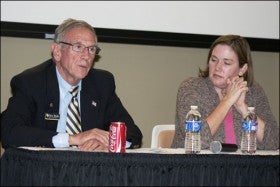At-large regent candidates take debate to Denver campus
Regent Steve Bosley and CU-Boulder law professor Melissa Hart, both running for the at-large seat on the Board of Regents, articulate their differences at Friday's debate sponsored by the School of Public Affairs at UC Denver.
Photo: Diane CarmanRegent Steve Bosley and CU-Boulder law professor Melissa Hart, both running for the at-large seat on the Board of Regents, articulate their differences at Friday's debate sponsored by the School of Public Affairs at UC Denver.
The two candidates for the at-large seat on the University of Colorado Board of Regents met in a debate Friday, Oct. 15, with one touting the value of business experience during challenging economic times; the other, the importance of having an educator on the nine-member board.
Steve Bosley, a Broomfield Republican who is running for a second six-year term on the Nov. 2 ballot, and challenger Melissa Hart, a Denver Democrat, took turns responding to questions during a one-hour event sponsored by the School of Public Affairs at the University of Colorado Denver. About 45 spectators attended the event at the Lawrence Street Center, which was moderated by the school's Maureen Ediger, a former regent.
Hart, a Harvard-educated lawyer who grew up in Denver, has taught law at the University of Colorado School of Law on the Boulder campus for 10 years. She said she understands well how important a resource the university is to the state.
"I am deeply committed to education. There are no educators on the board right now," she said, adding that the board spends too much time with political concerns. "I want to move away from politics and toward education."
Bosley, a banking and finance professional who retired as president and CEO of The Bank of Boulder after 24 years, said his background is well-suited for serving on the board during "the worst budget crisis in our 134-year history." He also emphasized the university's importance to the state.
"You can't be a healthy, viable state if you don't have a healthy, viable education system," he said. "We need to have an educated populous."
The budget crisis and state funding were themes of many questions, including one from an audience member who asked for guesses as to what would happen if funding from the state went away entirely.
Hart said she could imagine that happening if Amendments 60 and 61 and Proposition 101 are passed on Nov. 2. (The board passed a resolution denouncing the three ballot measures in July.)
"The devastation would be enormous," she said. "If they pass, tuition would have to go up more than it would if they don't pass. ... We're going to have to talk within the system about closing campuses, closing programs."
Bosley said the complete loss of state funding would require "drastic measures."
"The first thing is survival and keeping your doors open," he said.
In answering a separate question about how the university can thrive and survive during a budget crisis, Bosley said that even when the state is cutting funding, it still can help the university with efficiency: He pointed to Senate Bill 3 as an example of university leadership working with state lawmakers to give universities more flexibility in how they do business.
"We're not going to get more money from the state, but we're not going to balance the budget on the backs of students, either," Bosley said. "We have to look at the expense side and achieve more raw efficiencies."
He said there are hundreds if not thousands of gains in efficiency to be made in a process begun two years ago at CU. "If you study any major corporation over the last 20 years, it's a four- to seven-year process to restructure something that big. We're two years into it." He cited the ongoing review of the School of Journalism and Mass Communication at CU-Boulder as a "great example" of how the university can approach streamlining.
Hart said that she and her colleagues have quickly had to learn more about seeking out grant money on their own, and that the trend must continue.
"We know (the budget crisis) is going to be longer and more serious than we hoped it might be," she said. "What do we do? We need to keep doing what we've been doing and keep looking for savings."
When an audience member asked about the board's close vote in June (5-4) authorizing the university to appeal a court decision allowing concealed weapons on college campuses, Hart criticized Bosley for his no vote.
"I think the decision not to protect regent authority, when the Colorado Court of Appeals broke with precedent, was a terrible mistake," she said. "I'm glad five regents voted to appeal. I think this was an example of a political decision."
Bosley said Hart wasn't privy to attorney-client discussions during executive session, when he said he concluded that losing a potential legal battle would have more negative ramifications than any benefit from winning it. Hart responded by saying that the five regents who voted to pursue the appeal were part of those same discussions.
"That's why we have nine (regents) and not one," Bosley said.
Bosley closed by saying he feels Hart's legal expertise is less vital to challenges facing the regents than his business and finance experience, and that "this is not the time for on-the-job training." Hart responded: "My specialty is education."
The Nov. 2 election also will decide regent seats in the first and fourth districts; in the former, incumbent Michael Carrigan, D-Denver, is being challenged by Alex Maller, a Denver Republican; in the latter, Sue Sharkey, a Windsor Republican, and Robert "BC" Bishop-Cotner, a Windsor Democrat, are vying for the seat being vacated by Tom Lucero, R-Loveland, who is term-limited. For more on this year's candidates, see related story here.


